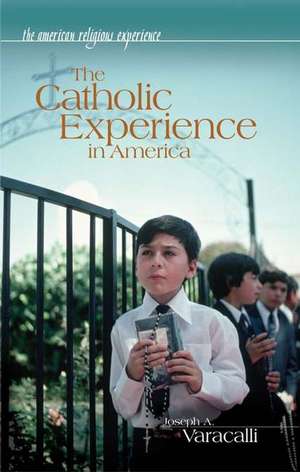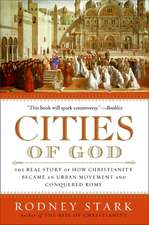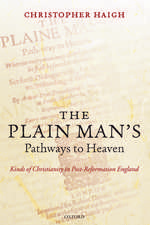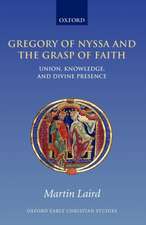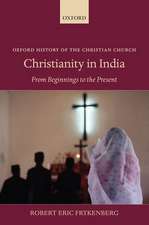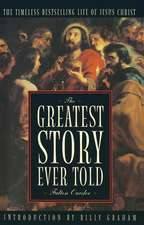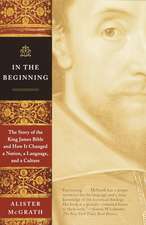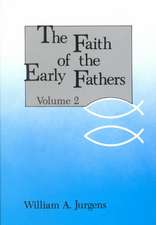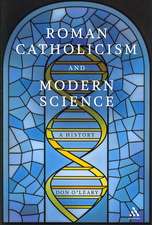The Catholic Experience in America: The American Religious Experience
Autor Joseph A. Varacallien Limba Engleză Hardback – 29 dec 2005 – vârsta până la 17 ani
Preț: 255.05 lei
Preț vechi: 436.49 lei
-42% Nou
Puncte Express: 383
Preț estimativ în valută:
48.81€ • 53.00$ • 41.00£
48.81€ • 53.00$ • 41.00£
Carte tipărită la comandă
Livrare economică 23 aprilie-07 mai
Preluare comenzi: 021 569.72.76
Specificații
ISBN-13: 9780313325830
ISBN-10: 0313325839
Pagini: 364
Dimensiuni: 156 x 235 x 31 mm
Greutate: 0.69 kg
Editura: Bloomsbury Publishing
Colecția Greenwood
Seria The American Religious Experience
Locul publicării:New York, United States
ISBN-10: 0313325839
Pagini: 364
Dimensiuni: 156 x 235 x 31 mm
Greutate: 0.69 kg
Editura: Bloomsbury Publishing
Colecția Greenwood
Seria The American Religious Experience
Locul publicării:New York, United States
Notă biografică
JOSEPH A. VARACALLI is State University of New York Distinguished Service Professor and Director of the Center for Catholic Studies at Nassau Community College-SUNY. He is the co-founder of the Society of Catholic Social Scientists.
Cuprins
Series ForewordPrefacePart I Two Thousand Years and Counting: The Catholic ExperienceChapter 1 The Catholic Theological and Philosophical WorldviewChapter 2 The Formal Organization of the Catholic ChurchChapter 3 The Universal in the Particular: The Universal Catholic Church in Time and SpacePart II Catholicism and Civilization in the United States: A Chronological OverviewChapter 4 Less Than Auspicious Beginnings: A Minority Church in a Protestant CultureChapter 5 "Brick by Brick and by the Grace of God": The Construction of a Catholic SubcultureChapter 6 Contemporary Catholicism in the United States: A Case of Maturation, Cleansing, and Revitalization or Decomposition, Domestication, and Internal Secularization?Chapter 7 Too Little, Too Late? John Paul II, Benedict XVI, and the Catholic Restorationist MovementPart III America's Best Kept Secret: Catholic Social ThoughtChapter 8 "Rome Has Spoken: Enough Said!"Chapter 9 Four Responses of American Catholics to Catholic Doctrine: Indifference, Rejection, Acceptance, or the Carving out of "La Via Media"Part IV Diversity within Unity? The Social Geography of the Contemporary American Catholic CommunityChapter 10 Varying Ethnic TraditionsChapter 11 Differing Socioeconomic Class BackgroundsChapter 12 Regional VariationsChapter 13 Generational ChangesChapter 14 Across the Life CourseChapter 15 Women and the ChurchChapter 16 The Issue of RaceChapter 17 Eastern CatholicismChapter 18 Religious Orders, Devotional Styles, and Other Internal Sources of Catholic DifferentiationChapter 19 Differing Theological and Philosophical WorldviewsPart V Controversies and Turning Points in American Catholic HistoryChapter 20 Historical Events before Vatican IIChapter 21 Contemporary Issues after Vatican IIPart VI What Lies Ahead? Charting out Different Possible Scenarios for the Catholic Church in the United StatesPostscript: Staying the Course with Benedict XVI in a Post-John Paul II ChurchAppendix A Church Documents DiscussedAppendix B Glossary of Key Terms UsedAppendix C Key Voluntary Organizations in the Catholic Church of the United StatesAppendix D Basic Demographic and Statistical Information about the Catholic Church Institution and Community in the United StatesAppendix E Key Locations (Museums, Colleges/Seminaries/ High Schools, Basilicas and Cathedrals, Shrines, Monasteries, and Feasts/Festivals)Appendix F Archival DepositoriesAppendix G Resource Guides on the WebAppendix H Timeline on the Catholic Experience in the United StatesBibliographyIndexAbout the Author
Recenzii
[A] thorough, accurate, and mostly unbiased account of the history of the Catholic Church in the United States..[F]or anyone, Catholic or non-Catholic, wanting to know more about the history and beliefs of the Church.
Joseph A. Varacalli's The Catholic Experience in America is..[a]n affirmative look at the social history of the Church, yet it does not back away from some of the challenges that the Church has faced-including the clergy abuse crisis of the past decade, the growing secularization of her colleges and universities, and the negative response of many progressive Catholics to her teachings on birth control, abortion, and homosexuality..While Varacalli, a founder of the Society for Catholic Scientists, is steadfast in his loyal support for the magisterium, he is also fair in presenting the not-so-loyal opposition.
The Catholic Experience in America offers a broad and helpful description of the church in America as a social institution. Varacalli, a sociologist, notes in particular the ongoing tension between loyalty to the nation and the development and decline of a Catholic plausibility structure, the institutions that socialize Catholics into willing acceptance of their church's teachings.
[O]ffers a multifaceted look at Catholic life in the United States..Varacalli knows well the legitimate diversity within American Catholicism. His treatment accounts for a long history of intra-ecclesial competition which this condition helped produce. His discussion of religious communities and devotions also accounts for the historical vitality of Catholic tradition in so many different times and settings; one community or devotional practice will emphasize or embody a particularly compelling insight from the rich Catholic treasury; another will highlight some insight, and so on. The end product is both an infinite complexity and a sociologically sensitive and efficient creature that can survive in widely and divergent contexts.
[V]aracalli is to be commended for striving to be as objective as possible in presenting the Catholic experience in America..In eight appendices the author presents much useful information about the Catholic Church in America. This is followed by an extensive bibliography on all things Catholic in the USA during the past 300 years or so. If you have the opportunity, it would be good to recommend to your local public library that it acquire this book for those who want to do research on the Catholic Church in America.
[A]n informed and fair-minded sketch both of the Catholic faith and of the history of the Catholic Church in the United States. The approach is strongly sociological with a good deal of sensitivity to cultural analysis of this institution and its membership. The prose is clear and concise, free of an initiate's jargon: theories and terms are always explained in accessible language. explained
[T]he Catholic Experience in America considers the many facets of life as a Catholic in modern America. From different faces of Catholicism within the American church to issues of race and gender, chapters provide historical and social background. The Catholic Experience in America provides thorough coverage of events which have affected the church and its religious foundations.
[C]ontext is everything. To know the recent historical context of the grave problems faced by Catholics in the U.S. is to enable ourselves to make all things new as the Scriptures tell us and to ensure that the Catholic Church in the U.S. develops the true vision of Vatican II and not the mediocre liberal caricature that for too long has been the default position in too many places. Varacalli's book will help you know that context.
Varacalli guides the reader effortlessly though the pertinent literature. He does not break much new ground here but that is not the point of this useful book, which describes the Catholic experience in America from its origins to the present in light of the findings of the most important scholarly research.
[S]erves not only to make us all aware of the high (and low) points of Catholic history in America but also serves as a fundamental introduction to the Catholic Church for non-Catholics and for the many Catholics who have received little or no effective catechesis, especially about the basic structure of the Catholic Church. As such, the book, while being unabashedly a product of academic professionalism, is also capable of an evangelization effect by introducing the Catholic Church accurately to students. This evangelization effect is possible because the author embraces the official teachings of the Church, instead of presenting readers with a tendentious mirage based on a liberal imagination, as we have in so many other works on the Catholic Church. His book is an example for all academics of combining straightforward professional work without compromising the truth of Catholic belief.
Drawing upon the best contemporary and objective scholarship, Varacalli's The Catholic Experience traces the historical fortunes of the Catholic Church in the United States from its first Anglo-beginnings in Colonial Maryland (also noting French and Spanish Catholic contributions), and examines carefully the interaction of Catholics with the surrounding culture..Valuable feature of The Catholic Experience in America are its appendices listing Church documents and Catholic organizations, key resources on the Internet, a glossary of key terms and phrases, and relevant demographical statistics. Varacalli's scholarly volume is highly recommended.
[S]hows how the Second Vatican Council was a turning point for how Catholics in the United States deal with the culture and relate to the Church's hierarchy and official teachings..Varacalli presents both sides fairly and lets the reader draw his or her own conclusions.
[A] work that has been widely praised in a variety of Catholic publications. Varacalli is a serious and responsible scholar who writes in a precise and balanced manner. Parents can be confident in the information he provides to counterbalance the secular humanist biases their children are likely to encounter in their textbooks, in both public and parochial schools.
[A]n excellent sociological overview of the Catholic experience in America..[s]ummarizes general trends and major turning points in American Catholic history, the rise and fall of a Catholic plausibility structure, and Catholic perspectives on contemporary issues such as homosexuality and family structure, birth control and women's health issues, abortion and the culture of death, and secularization in Catholic higher education. Appendices on Church documents, Catholic organizations, demographic and statistical information, a glossary of key terms, and an excellent Bibliography are also provided.
[A] sociologically informed history of the Catholic Church in the United States analyzing historical turning points and topics such as abortion, women in the church, and sexual scandals.
[E]xcellent introductions to the subject.
The readers of Catholic Southwest will find much information on the issues of immigration, nativism, racial and ethnic cooperation and conflict, and assimilation and segregation. But let me conclude on this note with the highest praise for Dr. Varacalli's book, a book made possible by the very courage of the late Roman Pontiff. Pope John Paul II may not have successfully arrested the deconstruction of the Catholic Church, but he did inspire new studies like the one at hand -- studies that at least offer a hopeful alternative to the progressivist scholarship and interpretation that overwhelmed the immediate post-Vatican II period.
The story of Catholicism in America may be an open book, but the book reads very differently depending on who's doing the writing.
Of his several books, this new one I think gives the greatest help in grasping just what has happened to the Catholic Church in this present period of the study's appearance..[v]ery valuable, and also very readable.
The Catholic Experience in America by Joseph Varacalli chronicles the history and present situation of the Church and the American subculture.
[W]orth having to refer to as well as to read. You should inquire at your public library asking for this book--if only to motivate the librarians to order the book. It is the kind of book that should be available in the library for citizens doing research on the Church or for students writing papers and such.
[T]he Catholic Experience in America warrants a close look by high school and college teachers, and by others curious about the past, present, and future of Catholicism in this country.
Readers interested in the changing fortunes of the Catholic Church in America will find Varacalli's work of great interest. He has managed to produce a study that is both scholarly and accessible to a general audience.
Joseph A. Varacalli's The Catholic Experience in America is..[a]n affirmative look at the social history of the Church, yet it does not back away from some of the challenges that the Church has faced-including the clergy abuse crisis of the past decade, the growing secularization of her colleges and universities, and the negative response of many progressive Catholics to her teachings on birth control, abortion, and homosexuality..While Varacalli, a founder of the Society for Catholic Scientists, is steadfast in his loyal support for the magisterium, he is also fair in presenting the not-so-loyal opposition.
The Catholic Experience in America offers a broad and helpful description of the church in America as a social institution. Varacalli, a sociologist, notes in particular the ongoing tension between loyalty to the nation and the development and decline of a Catholic plausibility structure, the institutions that socialize Catholics into willing acceptance of their church's teachings.
[O]ffers a multifaceted look at Catholic life in the United States..Varacalli knows well the legitimate diversity within American Catholicism. His treatment accounts for a long history of intra-ecclesial competition which this condition helped produce. His discussion of religious communities and devotions also accounts for the historical vitality of Catholic tradition in so many different times and settings; one community or devotional practice will emphasize or embody a particularly compelling insight from the rich Catholic treasury; another will highlight some insight, and so on. The end product is both an infinite complexity and a sociologically sensitive and efficient creature that can survive in widely and divergent contexts.
[V]aracalli is to be commended for striving to be as objective as possible in presenting the Catholic experience in America..In eight appendices the author presents much useful information about the Catholic Church in America. This is followed by an extensive bibliography on all things Catholic in the USA during the past 300 years or so. If you have the opportunity, it would be good to recommend to your local public library that it acquire this book for those who want to do research on the Catholic Church in America.
[A]n informed and fair-minded sketch both of the Catholic faith and of the history of the Catholic Church in the United States. The approach is strongly sociological with a good deal of sensitivity to cultural analysis of this institution and its membership. The prose is clear and concise, free of an initiate's jargon: theories and terms are always explained in accessible language. explained
[T]he Catholic Experience in America considers the many facets of life as a Catholic in modern America. From different faces of Catholicism within the American church to issues of race and gender, chapters provide historical and social background. The Catholic Experience in America provides thorough coverage of events which have affected the church and its religious foundations.
[C]ontext is everything. To know the recent historical context of the grave problems faced by Catholics in the U.S. is to enable ourselves to make all things new as the Scriptures tell us and to ensure that the Catholic Church in the U.S. develops the true vision of Vatican II and not the mediocre liberal caricature that for too long has been the default position in too many places. Varacalli's book will help you know that context.
Varacalli guides the reader effortlessly though the pertinent literature. He does not break much new ground here but that is not the point of this useful book, which describes the Catholic experience in America from its origins to the present in light of the findings of the most important scholarly research.
[S]erves not only to make us all aware of the high (and low) points of Catholic history in America but also serves as a fundamental introduction to the Catholic Church for non-Catholics and for the many Catholics who have received little or no effective catechesis, especially about the basic structure of the Catholic Church. As such, the book, while being unabashedly a product of academic professionalism, is also capable of an evangelization effect by introducing the Catholic Church accurately to students. This evangelization effect is possible because the author embraces the official teachings of the Church, instead of presenting readers with a tendentious mirage based on a liberal imagination, as we have in so many other works on the Catholic Church. His book is an example for all academics of combining straightforward professional work without compromising the truth of Catholic belief.
Drawing upon the best contemporary and objective scholarship, Varacalli's The Catholic Experience traces the historical fortunes of the Catholic Church in the United States from its first Anglo-beginnings in Colonial Maryland (also noting French and Spanish Catholic contributions), and examines carefully the interaction of Catholics with the surrounding culture..Valuable feature of The Catholic Experience in America are its appendices listing Church documents and Catholic organizations, key resources on the Internet, a glossary of key terms and phrases, and relevant demographical statistics. Varacalli's scholarly volume is highly recommended.
[S]hows how the Second Vatican Council was a turning point for how Catholics in the United States deal with the culture and relate to the Church's hierarchy and official teachings..Varacalli presents both sides fairly and lets the reader draw his or her own conclusions.
[A] work that has been widely praised in a variety of Catholic publications. Varacalli is a serious and responsible scholar who writes in a precise and balanced manner. Parents can be confident in the information he provides to counterbalance the secular humanist biases their children are likely to encounter in their textbooks, in both public and parochial schools.
[A]n excellent sociological overview of the Catholic experience in America..[s]ummarizes general trends and major turning points in American Catholic history, the rise and fall of a Catholic plausibility structure, and Catholic perspectives on contemporary issues such as homosexuality and family structure, birth control and women's health issues, abortion and the culture of death, and secularization in Catholic higher education. Appendices on Church documents, Catholic organizations, demographic and statistical information, a glossary of key terms, and an excellent Bibliography are also provided.
[A] sociologically informed history of the Catholic Church in the United States analyzing historical turning points and topics such as abortion, women in the church, and sexual scandals.
[E]xcellent introductions to the subject.
The readers of Catholic Southwest will find much information on the issues of immigration, nativism, racial and ethnic cooperation and conflict, and assimilation and segregation. But let me conclude on this note with the highest praise for Dr. Varacalli's book, a book made possible by the very courage of the late Roman Pontiff. Pope John Paul II may not have successfully arrested the deconstruction of the Catholic Church, but he did inspire new studies like the one at hand -- studies that at least offer a hopeful alternative to the progressivist scholarship and interpretation that overwhelmed the immediate post-Vatican II period.
The story of Catholicism in America may be an open book, but the book reads very differently depending on who's doing the writing.
Of his several books, this new one I think gives the greatest help in grasping just what has happened to the Catholic Church in this present period of the study's appearance..[v]ery valuable, and also very readable.
The Catholic Experience in America by Joseph Varacalli chronicles the history and present situation of the Church and the American subculture.
[W]orth having to refer to as well as to read. You should inquire at your public library asking for this book--if only to motivate the librarians to order the book. It is the kind of book that should be available in the library for citizens doing research on the Church or for students writing papers and such.
[T]he Catholic Experience in America warrants a close look by high school and college teachers, and by others curious about the past, present, and future of Catholicism in this country.
Readers interested in the changing fortunes of the Catholic Church in America will find Varacalli's work of great interest. He has managed to produce a study that is both scholarly and accessible to a general audience.
